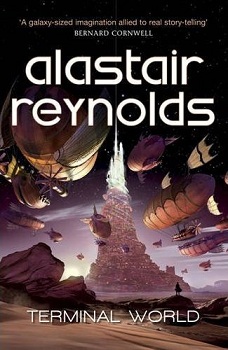E. Catherine Tobler noticed that her friend Christopher DeFilippis’s top five books from 2013 didn’t contain any woman writers and asked him about it. It turned out he hadn’t read any female writers in two years:
I asked him on Twitter what his favorite books by female authors were for the year, and to his surprise, he realized he hadn’t read any female authors in 2013. Nor, it turns out, had he read any female authors in 2012. (Octavia Butler made his best-of list in 2011.)
“In my defense,” Chris tweeted when a couple followers made author suggestions, “it’s more coincidence than ailment that needs a remedy.”
Then, I asked him if I could blog about this, because…
Two years.
It’s a remarkable oversight, to exclude a whole gender from your reading without even noticing and that for two years in a row. However, I can’t help but feel sympathy for Christopher, as it happened to me to. In 2010 I discovered that only ten percent of the fantasy and science fiction I’d read in the past decade had been written by women. Now I knew I read more blokes than women, but it was a real shock to discover how lobsided the ratios were. I wasn’t the only one; in my little corner of the science fiction internet quite a few people came to the same sort of conclusion and attempted to do something about it.
it’s more coincidence than ailment that needs a remedy.
Again, I can sympathise. I never set out to exclude women from my reading, or to read only male writers; it just happened that way. Because I was just following my reading instincts, read whatever seemed interesting or from authors I already knew and trusted, my reading was channeled into a mostly blokeish channel. Clearly something had to change if I wanted to be more inclusive in my reading. If I thought this was important enough, I couldn’t keep up with the same habits. If Christopher feels the same way, if he thinks this important too, there is one thing that he can do to fix his reading.
He should set himself quotas.
Because quotas work.
Good intentions and a vague will to change aren’t enough, you need something you can measure, preferably in public so you can hold yourself accountable for your choices. You don’t necessarily need to keep these quotas up forever of course, just as long as it takes to change your outdated reading habits. Otherwise it’s just too easy to slip back into them, or to let fear of the unknown chase you back to safer grounds.
Of course, some people might think it unfair on the hypothetical male authors who miss out on your reading attention, but considering there are well over a 1,000 books of genre interest published each year, you should feel guilty already no matter who you chose to read…
The other fear you might have is that of missing out on reading the people everbody else is reading, but this is also something that’s deeply gender unbalanced. Male authors get a disproportionate share of fandom and media attention, so a grassroots attempt to change this is long overdue anyway. It’s this what’s at the heart of the Russ Pledge Nicola Griffith came up with a few years ago, to not just read more women, but also pay more attention to women, the necesssity of which is proven by the simple fact that even a well connected, well read person like Christopher DeFillippis can go two years without reading women and not even realise it.
Finally, as Anil Dash found out in a different context when he made the decision last year to only retweet women, the rewards of being more gender inclusive can be immediate:
For me, for my experience, it’s better. I feel happier about the time I spend on Twitter, and it’s made me try to be more thoughtful, and more disciplined with other things I do in my time online.
Personally, I found something similar when I made the decision to prioritise female authors over male. I discovered authors I’d never would’ve noticed otherwise, as well as authors writing the kind of books I didn’t get from the ones I was already reading. My sf reading has become richer and more rewarding.
So, give it a go. You never know, you might like it.
And if you don’t know where to start or whom to read? That’s what Sf Mistressworks is for.
